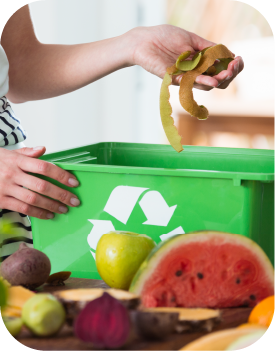
More than two-thirds of California’s waste stream is organics. That is a lot considering that one in eight Californians don’t have enough food to eat.
California’s new organics recycling law addresses both the human and environmental price of waste through organics recycling and a local food recovery program. Recycling organics reduces greenhouse gas emissions that contributes to climate change, it also helps produce materials that are good for the planet, like compost, fertilizer and biofuels!
Beginning August 2022, the City of Indio will roll out a new organics program, in compliance with Senate Bill 1383 (SB 1383), which builds upon already existing state recycling laws. All single- and multi-family homes and businesses are required to sort food scraps and yard waste into an organics bin.
You can make sure your waste makes it to the right place, by putting it in the bins as follows:

Green
organics
Blue
RECYCLING
Grey
TRASH
A food secure future.
In addition to recycling organics, the new program helps fight local hunger by taking unused, edible food from restaurants, grocery stores and other businesses and giving it to food banks and other community organizations for distribution to residents in need. Working together with these partners, the City of Indio will support participation in food recovery, ensuring our families, friends and neighbors have access to the food they need to live an active, healthy life. The state requires a 20 percent increase in food recovery by January 2025.
Frequently Asked Questions
Want to learn more?
We are here to help! Contact Sara Toyoda at stoyoda@indio.org to learn more about organics recycling. For more information about statewide organics recycling efforts and SB 1383, go to www.calrecycle.ca.gov/organics.
Get in touch





